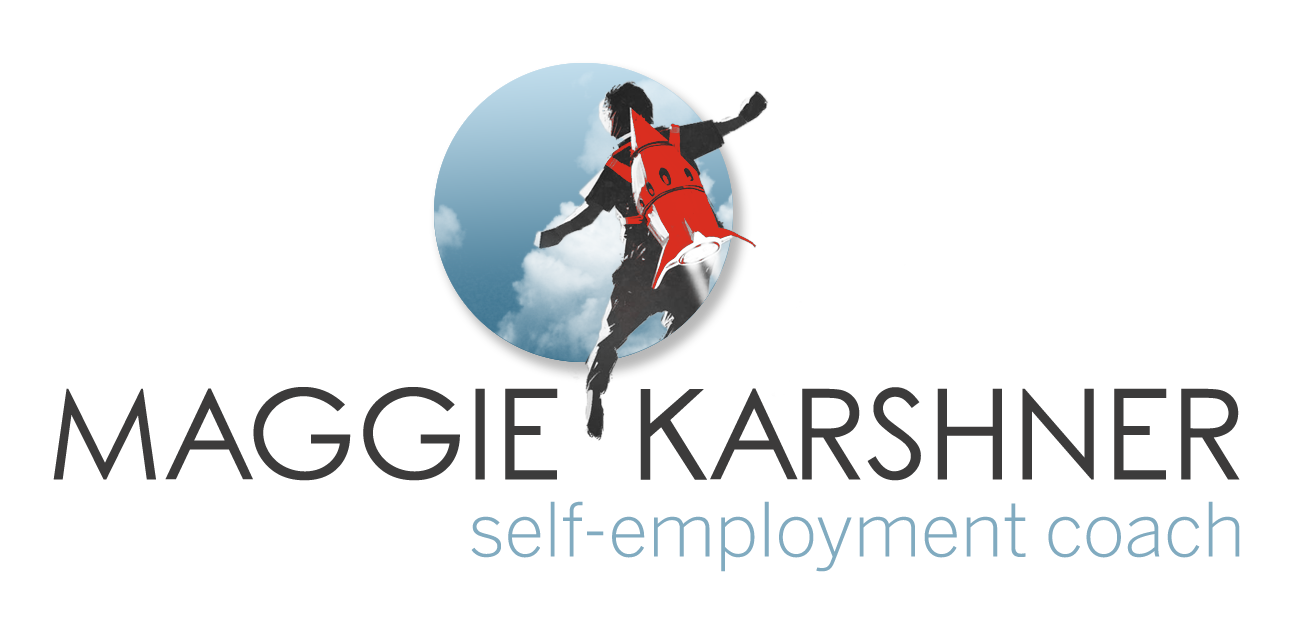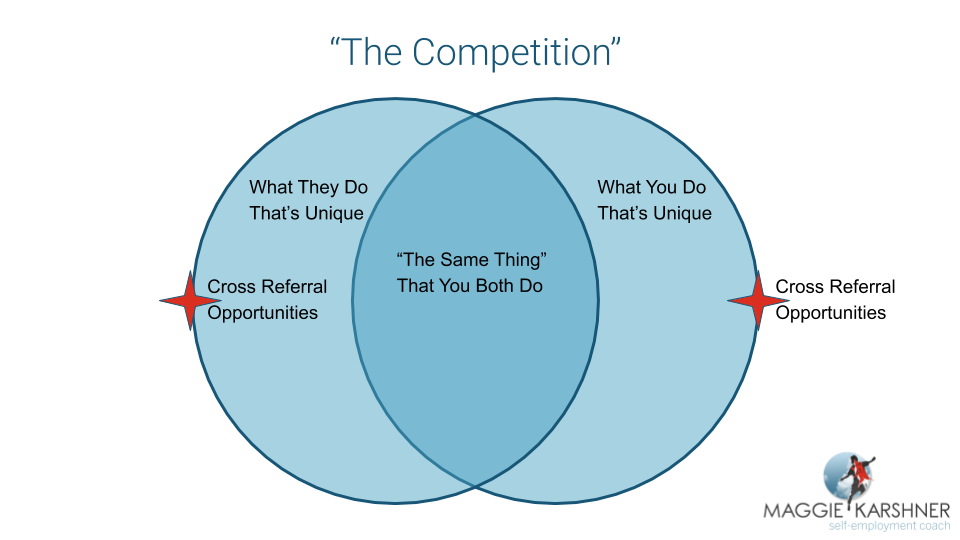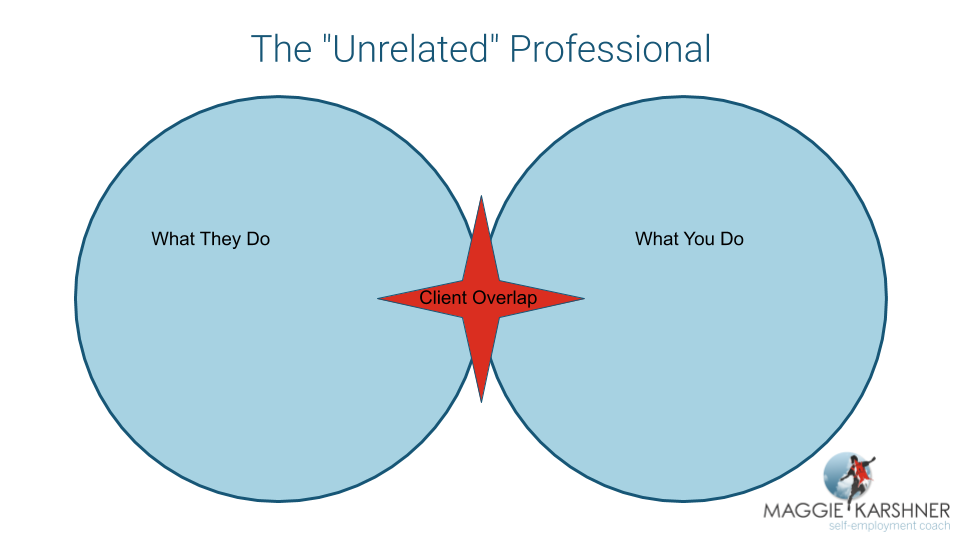The Most Frequently Missed Opportunities When Networking
/Summer is upon us in the Pacific Northwest and with it brings tons of opportunities for socializing! As you're mixing and mingling you're likely to come across other professionals who are also self-employed, or otherwise need to make connections to help their business thrive. While I hear many stories of success, I notice that there are two common reactions to other professionals that are particularly not helpful. Here they are, and what to do about them:
Reaction 1: The "Competition"
This is that thought that goes through your head and sounds something like this: "Oh, god, what they do is *just* *like* *me* and clearly we're competition and now we cannot talk to each other." Or, even worse "and clearly they're better at this than me, so I must shrink in fear!"
This reaction is totally normal considering the way our society understands competition, and it's totally not helpful when you'd benefit from alliances with other business owners! So let's try to look at this a different way.
Whenever I find myself intimidated, the first thing I try to do is center myself in my own standard for how humans and society behave. My standard is not one of cut-throat competition. I want to live in a world where we all support each other - where one person's achievements does not diminish another's success or vice versa. And people who are good at something want others to be good at it too, and not in a patronizing way. We strive to lift each other up, not tear each other down.
Since this is the standard I'm holding, when someone who is very good at the same thing I do treats me like the competition or like I'm less than, then I know they're not worth my time to align myself with. They're not living their ideals in the same way I am, and that would make a collaborative, mutually beneficial alliance impossible. So I don't fear this possibility; if they treat me like the competition, that doesn't diminish me. (In fact, it actually diminishes them and I usually feel sad that they're operating from such a stressful world-view.) So I fearlessly engage my "competition" so that I can learn if we're both interested in lifting each other up!
On a more pragmatic level, we can also examine what mutual benefit two professionals in the same industry can offer. For any business owner that provides a service, it's highly unlikely that you both do *exactly* the same thing. You are two different people with very different personalities. For example, two massage practitioners who attended the exact same training at the exact same time still have a different style and different preferences in what services they provide (relaxing massage, vs. deep tissue, vs. therapeutic, etc.)
Challenge yourself to learn more about this professional until you can see the differences in the work you each do or in the people you work with. As a last resort, they probably have different availability than you, so if one of you ever can't fit a client into your schedule, you could refer to the other. There are huge benefits to having someone to refer clients to if they're not a good fit for you, for any reason!
Reaction 2: The "Unrelated" Professional
You meet someone new and learn that they're in business for themselves, but in an industry wildly different than your own. Maybe you seize this opportunity to connect with someone in a similar situation to yourself, so you commiserate on the struggles of self-employment. Ah, wasn't that a nice and novel interaction. The end.
WAIT A MINUTE!!! Sure, your industries don't seem to intersect, but networking is key for EVERYONE in business for themselves. Even a hair dresser and a mathematical consultant could potentially cross-refer. Technically anyone at a gathering could refer to you, but a person in business for themselves is going to have a value in this connection that goes above and beyond the average person wanting to get to know a new hair dresser / consultant / etc.
To grease the wheels of conversation, ask them about their work, what sets them apart from other people in the same field, and about their ideal client. Ask to exchange cards and let them know what situations or types of people they should be sending your way.
For the Graphically Inclined
The way I think about this, any two people form a Venn diagram. If you have a lot in common, then there's a lot of overlap. If you don't have a lot in common then there might be only a single point of overlap. (If you'd really rather not be around that person, maybe you're just two circles that don't touch!)
This analogy carries through to your respective client bases. There might be a lot or a little overlap, but there *is* some point of connection. With someone we might view as "the competition" there's a lot of overlap, but we actually want to engage that person on the not-overlapping outer edge of their sphere. Who are the people who don't even make it into their circle, but would fit great in yours? Rather than focusing on the shaded area in the Venn diagram, we're actually looking at the fringes to find those cross-referral opportunities.
With someone we might consider "unrelated" there's some point of intersection and our task is to make a path to understanding that overlap. Rather than focusing on how the two circles don't seem to meet, we're actually looking for that moment of intersection. Since you probably don't have a client in common yet, this is like crafting something with playdoh; it's not going to look like much at the start, but as you work with it, it'll become more clear.
Once you've identified the overlap, that will help you know how to hit your networking out of the park by helping them understand what you do in a way that helps them channel people your direction. I'll write more about this in next month's blog article, so stay tuned!






